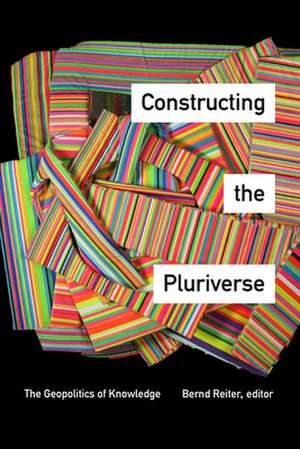Constructing the Pluriverse – The Geopolitics of Knowledge
Autor Bernd Reiteren Limba Engleză Paperback – 13 sep 2018
Contributors. Zaid Ahmad, Manuela Boatcă, Hans-J rgen Burchardt, Raewyn Connell, Arturo Escobar, Sandra Harding, Ehsan Kashfi, Venu Mehta, Walter D. Mignolo, Ulrich Oslender, Issiaka Ouattara, Bernd Reiter, Manu Samnotra, Catherine E. Walsh, Aram Ziai
| Toate formatele și edițiile | Preț | Express |
|---|---|---|
| Paperback (1) | 239.93 lei 22-36 zile | +22.91 lei 5-11 zile |
| MD – Duke University Press – 13 sep 2018 | 239.93 lei 22-36 zile | +22.91 lei 5-11 zile |
| Hardback (1) | 612.79 lei 22-36 zile | +24.75 lei 5-11 zile |
| MD – Duke University Press – 13 sep 2018 | 612.79 lei 22-36 zile | +24.75 lei 5-11 zile |
Preț: 239.93 lei
Nou
Puncte Express: 360
Preț estimativ în valută:
45.91€ • 47.65$ • 38.38£
45.91€ • 47.65$ • 38.38£
Carte disponibilă
Livrare economică 24 februarie-10 martie
Livrare express 07-13 februarie pentru 32.90 lei
Preluare comenzi: 021 569.72.76
Specificații
ISBN-13: 9781478000167
ISBN-10: 1478000163
Pagini: 352
Dimensiuni: 152 x 229 x 19 mm
Greutate: 0.52 kg
Editura: MD – Duke University Press
ISBN-10: 1478000163
Pagini: 352
Dimensiuni: 152 x 229 x 19 mm
Greutate: 0.52 kg
Editura: MD – Duke University Press
Cuprins
Foreword. On Pluriversality and Multipolarity / Walter D. Mignolo ix
Introduction / Bernd Reiter 1
Part I. Toward the Pluriverse
1. Meeting at the Edge of Fear: Theory on a World Scale / Raewyn Connell 19
2. One Planet, Many Sciences / Sandra Harding 39
3. Transition Discourses and the Politics of Rationality: Toward Designs for the Pluriverse / Arturo Escobar 63
4. On Pluriversality and Multipolar World Order: Decoloniality after Decolonization: Dewesternization after the Cold War / Walter D. Mignolo 90
5. Internationalism and Speaking for Others: What Struggling against Neoliberal Globalization Taught Me about Epistemology / Aram Ziai 117
Part II. Other Ontologies
6. Local Aquatic Epistemologies among Black Communities on Colombia's Pacific Coast and the Pluriverse / Ulrich Oslender 137
7. The Griots of West Africa: Oral Tradition and Ancestral Knowledge / Issiaka Ouattara 151
8. Experimenting with Freedom: Gandhi's Political Epistemology / Manu Samnotra 168
9. Development as Buen Vivir: Institutional Arrangements and (De)Colonial Entanglements / Catherine Walsh 184
Part III. Other Sciences and Epistemologies
10. Caribbean Europe: Out of Sight, out of Mind? / Manuela Boatcä 197
11. How Spinoza and Elias Help to Decenter Our Understanding of Development: A Methodological Research Proposal on the Pluriverse / Hans-Jürgen Burchardt 219
12. In Quest of Indigenous Epistemology: Some Notes on a Fourteenth-Century Muslim Scholar, Ibn Khaldun (1332-1406) / Zaid Ahmad 240
13. Anekäntaväda: The Jaina Epistemology / Venu Mehta 259
Part IV. Rethinking Politics, Democracy, and Markets
14. First People of the Americas: Lessons on Democracy, Citizenship, and Politics / Bernd Reiter 279
15. Iran's Path toward Islamic Reformism: A Study of Religious Intellectual Discourse / Eshan Kashfi 298
Conclusion / Bernd Reiter 313
Contributors 319
Index 325
Introduction / Bernd Reiter 1
Part I. Toward the Pluriverse
1. Meeting at the Edge of Fear: Theory on a World Scale / Raewyn Connell 19
2. One Planet, Many Sciences / Sandra Harding 39
3. Transition Discourses and the Politics of Rationality: Toward Designs for the Pluriverse / Arturo Escobar 63
4. On Pluriversality and Multipolar World Order: Decoloniality after Decolonization: Dewesternization after the Cold War / Walter D. Mignolo 90
5. Internationalism and Speaking for Others: What Struggling against Neoliberal Globalization Taught Me about Epistemology / Aram Ziai 117
Part II. Other Ontologies
6. Local Aquatic Epistemologies among Black Communities on Colombia's Pacific Coast and the Pluriverse / Ulrich Oslender 137
7. The Griots of West Africa: Oral Tradition and Ancestral Knowledge / Issiaka Ouattara 151
8. Experimenting with Freedom: Gandhi's Political Epistemology / Manu Samnotra 168
9. Development as Buen Vivir: Institutional Arrangements and (De)Colonial Entanglements / Catherine Walsh 184
Part III. Other Sciences and Epistemologies
10. Caribbean Europe: Out of Sight, out of Mind? / Manuela Boatcä 197
11. How Spinoza and Elias Help to Decenter Our Understanding of Development: A Methodological Research Proposal on the Pluriverse / Hans-Jürgen Burchardt 219
12. In Quest of Indigenous Epistemology: Some Notes on a Fourteenth-Century Muslim Scholar, Ibn Khaldun (1332-1406) / Zaid Ahmad 240
13. Anekäntaväda: The Jaina Epistemology / Venu Mehta 259
Part IV. Rethinking Politics, Democracy, and Markets
14. First People of the Americas: Lessons on Democracy, Citizenship, and Politics / Bernd Reiter 279
15. Iran's Path toward Islamic Reformism: A Study of Religious Intellectual Discourse / Eshan Kashfi 298
Conclusion / Bernd Reiter 313
Contributors 319
Index 325
Notă biografică
Bernd Reiter, editor
Descriere
The contributors to this volume explore how non-Western, pluriversal approaches to core questions in the social sciences and humanities can help to dramatically rethink the relationship between knowledge and power.
